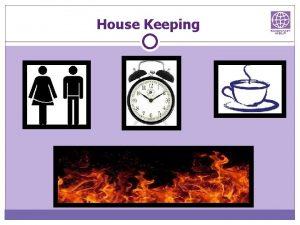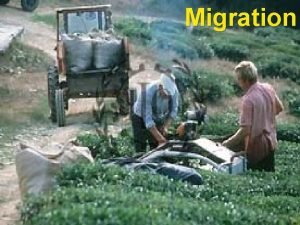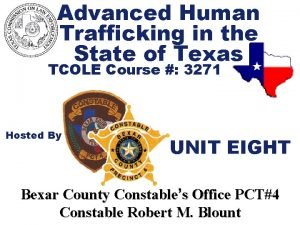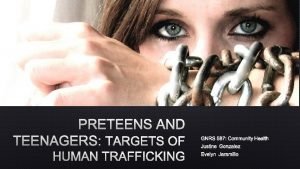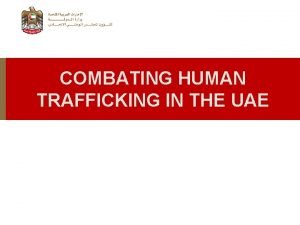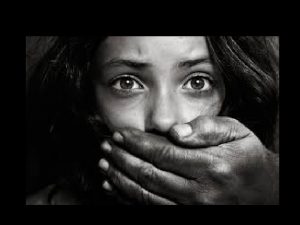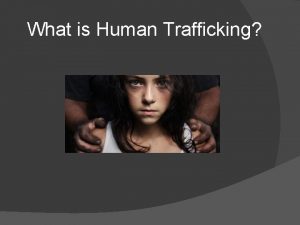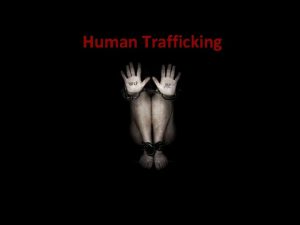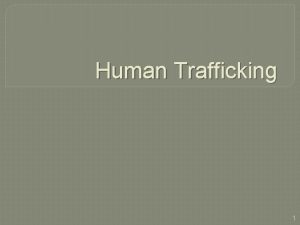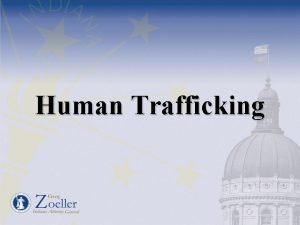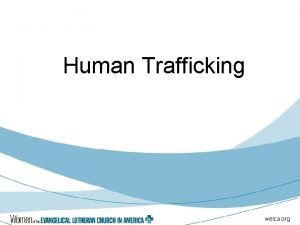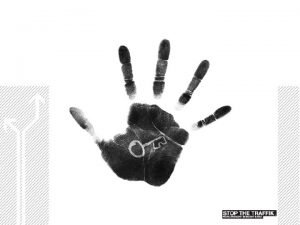European response to Human trafficking Human trafficking is









- Slides: 9

European response to Human trafficking

Human trafficking is a grave violation of fundamental human rights and an extremely pernicious and highly lucrative form of transnational organised crime.

Article 5(3) EU charter of fundamental right • • “Prohibition of slavery and forced labour 1. No one shall be held in slavery or servitude. 2. No one shall be required to perform forced or compulsory labour 3. Trafficking in human beings is prohibited”

Article 79 TFEU 1. The Union shall develop a common immigration policy aimed at ensuring, at all stages, the efficient management of migration flows, fair treatment of third-country nationals residing legally in Member States, and the prevention of, and enhanced measures to combat, illegal immigration and trafficking in human beings. 2. For the purposes of paragraph 1, the European Parliament and the Council, acting in accordance with the ordinary legislative procedure, shall adopt measures in the following areas: (a) the conditions of entry and residence, and standards on the issue by Member States of long-term visas and residence permits, including those for the purpose of family reunification; (b) the definition of the rights of third-country nationals residing legally in a Member State, including the conditions governing freedom of movement and of residence in other Member States; (c) illegal immigration and unauthorised residence, including removal and repatriation of persons residing without authorisation; (d) combating trafficking in persons, in particular women and children. 3. The Union may conclude agreements with third countries for the readmission to their countries of origin or provenance of third-country nationals who do not or who no longer fulfil the conditions for entry, presence or residence in the territory of one of the Member States. 4. The European Parliament and the Council, acting in accordance with the ordinary legislative procedure, may establish measures to provide incentives and support for the action of Member States with a view to promoting the integration of thirdcountry nationals residing legally in their territories, excluding any harmonisation of the laws and regulations of the Member States. 5. This Article shall not affect the right of Member States to determine volumes of admission of third-country nationals coming from third countries to their territory in order to seek work, whether employed or self-employed.

Article 83 TFEU 1. The European Parliament and the Council may, by means of directives adopted in accordance with the ordinary legislative procedure, establish minimum rules concerning the definition of criminal offences and sanctions in the areas of particularly serious crime with a cross-border dimension resulting from the nature or impact of such offences or from a special need to combat them on a common basis. These areas of crime are the following: terrorism, trafficking in human beings and sexual exploitation of women and children, illicit drug trafficking, illicit arms trafficking, money laundering, corruption, counterfeiting of means of payment, computer crime and organised crime. On the basis of developments in crime, the Council may adopt a decision identifying other areas of crime that meet the criteria specified in this paragraph. It shall act unanimously after obtaining the consent of the European Parliament. 2. If the approximation of criminal laws and regulations of the Member States proves essential to ensure the effective implementation of a Union policy in an area which has been subject to harmonisation measures, directives may establish minimum rules with regard to the definition of criminal offences and sanctions in the area concerned. Such directives shall be adopted by the same ordinary or special legislative procedure as was followed for the adoption of the harmonisation measures in question, without prejudice to Article 76. 3. Where a member of the Council considers that a draft directive as referred to in paragraph 1 or 2 would affect fundamental aspects of its criminal justice system, it may request that the draft directive be referred to the European Council. In that case, the ordinary legislative procedure shall be suspended. After discussion, and in case of a consensus, the European Council shall, within four months of this suspension, refer the draft back to the Council, which shall terminate the suspension of the ordinary legislative procedure. Within the same timeframe, in case of disagreement, and if at least nine Member States wish to establish enhanced cooperation on the basis of the draft directive concerned, they shall notify the European Parliament, the Council and the Commission accordingly. In such a case, the authorisation to proceed with enhanced cooperation referred to in Article 20(2) of the Treaty on European Union and Article 329(1) of this Treaty shall

Directive 2011/36/UE on combating and preventing trafficking in human beings and protecting its victims

Anti-trafficking coordinator

Others directives • Directive 2004/81/EC on the residence permit • Directive 2012/29/EU establishing minimum standards on the rights, support and protection of victims of crime.

Others policy initiative • The EU Anti-Trafficking Day Established on 18 October of every year. The first Anti-Trafficking Day in 2007 had the motto "Time for action". On that occasion, JLS presented Recommendations on the identification and referral to services of victims of trafficking in human beings, and an Assessment Manual on Measuring responses to Trafficking in Human Beings, which can be used by Member States to self-assess their anti-trafficking policy on the basis of comparable criteria. • Anti-trafficking policy website Launched end 2010 It would become one stop shop for practitioners and the public interested in the problem of trafficking with following content: – European, international and national legislation – EU Policy contributions (policy papers, research reports, articles, books on various aspects of antitrafficking policy, European project results). – National Information Pages for all 27 Members States.


